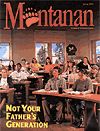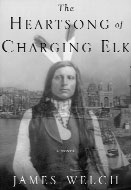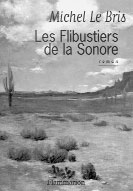
Spring 2000
CONTENTS
The Last Best Good Story
Not Your Father's Generation
Hooked On Teaching
Bucking Trends
Amazon Dreams
C'est Missoula Vie
AROUND THE OVAL
SPORTS
CLASS NOTES
ALUMNI NOTES
Contact Us
About the Montanan
PAST ISSUES
by Patia stephens
This time of year, I daydream about California and Florida, dragging my toes through the sparkling surf, sun on my bare shoulders. I remember fondly the sticky, sultry August heat of New Orleans. I fantasize about packing up and moving somewhere I've never been before, maybe Italy or Morocco, somewhere with spices and warmth and bold colors. But if I must endure February in Montana, I count my blessings I can endure it in Missoula. At least here I can take miniature trips to faraway places, even on a student budget. I can step inside the little market at Broadway and Madison for a jar of Greek olives and a pound of Romano cheese, grated for me by the charming silver-haired Italian proprietor. I can get red curry paste and chili-garlic sauce at the Asian market, baguettes at the French bakery, samosas and chutney at the Indian cafe. I can eavesdrop on foreign conversations in a showing at the local independent movie house, listen to Celtic, African and Caribbean rhythms on the public radio station. 
This February, I was especially lucky to live in Missoula. Because this year, the town at the confluence of three great rivers also was at the center of two great events: "The Jazz Age in Paris: 1914-1940" exhibit and a conference called "Writing Away From Home." The events, both sponsored in part by UM, offered a chance to escape the winter doldrums while exploring the meanings of identity, place and democracy. For a few whirlwind weeks, western Montanans could delve into the exuberant cross-cultural world of jazz music, overlapped by three days of conversations and readings by contemporary French and Montana writers. The first night of February is dark and damp, but those of us who pack the University Theatre to hear jazz great Billy Taylor are quick to warm up. Framed by the gilt-and-maroon-velvet art deco glamour of the theatre, Taylor and his grand piano kick off the Jazz Age in Paris celebration with a riff on "Jazz as a Metaphor for Democracy." Taylor's talk, part of the UM President's Lecture Series, begins by touching on jazz's roots. The "spiritual" evolved as a form of communication among African-American slaves, he explains, when other mediums were silenced. "It forced them to create music that expressed emotions," he says, then taps out a gently wrenching tune. Unexpectedly, I feel tears welling up somewhere deep in my heart, in the place where pain and hope live, but Taylor saves me by segueing into a faster, more jubilant rhythm. From the spiritual, Taylor tells us, it was a short jump to ragtime, then jazz and boogie-woogie. Indigenous to America, jazz crossed cultural and color lines, welcoming contributions from other music forms and allowing players to make a personal statement. Jazz is democratic because it is a universal language, he says. "When I sit down and play a jazz piece, I don't have to tell you whether this is sad or happy." He plays another melancholy tune, then breaks into a melody that is all sunshine. 
When the audience enthusiastically applauds, Taylor's elegant demeanor and supple voice are offset by a genuinely appreciative grin. The renowned musician and educator—holder of a doctorate from the University of Massachusetts and 19 honorary degrees—looks about 40, rather than the 78 years he professes. "I really believe music keeps you young," he says. He plays more—including a song he was commissioned to write about Martin Luther King Jr., with whom he worked during the Civil Rights Movement—and shares a few personal anecdotes. In the 1940s and '50s, Taylor performed with legends like Charlie Parker, Miles Davis, John Coltrane, Billie Holiday, Ella Fitzgerald and Dizzy Gillespie. After two standing ovations, the audience finally lets Taylor conclude his performance. Emerging into the brisk Missoula night, I know I have been in the presence of greatness—and that I've seen democracy in action. Two mornings later, I arrive at the first panel discussion of "Writing Away From Home," billed as an international celebration of literary and cultural connections. It's nearly 10 a.m., and the rare winter sun is emerging over Hellgate Canyon, gushing into the third-story windows of the Missoula Children's Theatre. I pick a seat where I will be directly in the path of the pale, hazy rays. Soon I am surrounded by two dozen or so high school students speaking rapid-fire French. I turn to the blonde teen-ager to my right and ask, "Are you from France?" "Yes," she replies. "When did you get here?" I ask. She looks puzzled. I repeat my question but none of the four or five girls now looking at me appear to understand. Reaching into the upper shelf of my brain, I attempt to pull out some dusty phrases. "Quand . . . " is all I can manage. My French teacher would be disgusted. The girls realize it's hopeless. "Madame, madame!" they call. Their teacher turns and answers my questions in perfect, if impersonal, English. They arrived here four days earlier, part of a contingent visiting local high schools. The teacher turns away, and I sit quietly, soaking up the sun's warmth and the occasional decipherable words: C'est la . . . lunette. The panelists take their places at a long table. Speaking on the subject of "Writing Away From Home" are French authors Michel Le Bris and Roland Brival, along with Montana writers David James Duncan, Martha Elizabeth and Fred Haefele, plus moderator Robert Sims Reid. "'Writing Away From Home' means trying to come to terms with the place you are now and the place you left behind, which may be the same place," explains Reid, a Missoula police detective and author of five novels. The writers, most of whom live in places other than where they grew up, talk about trying to find their way home. As one who never knows what to say when people ask, "Where are you from?" I can relate. "I cannot remember a time when I didn't want to go away," says Elizabeth, a poet who landed in Montana from Virginia by way of Texas. "I don't know why, but I always felt I was in the wrong place." Among these writers, the West in general and Missoula in particular seem to satisfy this figurative sense of homelessness. Haefele talks about discovering Montana as the place he dreamed about as a boy in Michigan, while Le Bris tries to explain the West's allure. "If I am fascinated with the frontier of the American West, it is because it is similar to Brittany," Le Bris says in his thick French accent. "The frontier is the place between nature and culture, modernity and history." I think Le Bris has it right—those of us who live in the West have our feet in two different worlds. We want the best of both. The other French writer on the panel, Roland Brival, who is from the West Indies and now lives in Paris, adds a unifying message for those of us uncertain about our place in the world. "Don't be American, don't be French; be human," says Brival, whose ancestors come from three continents. "Cross the frontier, and the frontier is in you." Friday's panel on "Margins and Metaphors" continues the discussion about living outside the mainstream, with Missoula author and moderator Deirdre McNamer relating a fly fishing metaphor: "Cast on the edges—that's where the big fish lie." Montana writers James Welch and Debra Earling debate about who has the right to write about Indians: Earling claims Ian Frazier's new book, The Rez, is flawed for "extracting valor" from the oppressed, while Welch doesn't have a problem with it. In the audience, a French man with wild hair and brilliant green glasses recounts hearing Indian novelist Sherman Alexie say that "the best of us never leave the reservation." "You carry the reservation with you," Welch responds. "You carry it in your heart." Earling adds that those who literally remained on the reservation allowed a younger generation of Indians to maintain their identity. "So we can go home again," she says. That, I think, is one of the reasons non-Indians—Americans and Europeans alike—romanticize indigenous peoples. Disconnected from our own histories and families, we covet the connections Indians have to their homes, their kin, their cultures and religions. When I later get a chance to talk with Welch, he calls this tendency dehumanizing. "If you think of Indians as purely spiritual people, you're denying them their humanity," he says. "They are human just like everybody else." Conferences like this one have a humanizing effect, Welch says. "When you think of people of different nations, you think of them in an abstract. But when you actually meet them, you realize they have the same concerns we do, and it makes for a better understanding." If history had turned out differently, eastern Montana might be part of France today. Instead, France sold the Louisiana Territory to the United States in 1803. But from the French-Canadians who, in 1743, were the first whites to glimpse the future state—they described a land of "shining mountains"—to those who settled Missoula Valley's Frenchtown in the mid-1800s, Montana has always maintained a French connection. And since the revolutions, America and France have had a special relationship based on democracy. When I get a chance to speak with publisher Francis Geffard, who specializes in promoting Western writers in France, I ask him why the French are so drawn to the West. "We have a very special relationship with America," Geffard says. "We love it and hate it at the same time. Often when we say 'American culture' it is a negative thing. It can mean violence, power, consumerism, uncontrolled capitalism, discrimination." These problems, he continues, are not as prevalent in the West due to its rural nature. It is a culture the French can relate to. "What America is about—justice, freedom, equality—has not been realized yet. So maybe what the West means to French people is that it is the place where the American project can be fulfilled." In his book, Ten Tough Trips, UM English Professor Emeritus Bill Bevis explores the terrain of the first Western novel. Though it was written in Paris in 1827 by James Fenimore Cooper, an American who never had been west of the Mississippi, Bevis says The Prairie offers a true vision of the West as an uncivilized land of great potential. "Montana—in the heart of the West, old and new, Indian and white," Bevis writes. "Its writers speak very well for the high plains and northern Rockies, that area of beaver, gold, cattle, and cold that to the whole world is 'The West.' We are connected to Afghanistan, to Arab cries, to Paris papers, even by the myth that we are not. The dream of Montana as a fresh start was the dream of an old world." At Friday's reading, Welch and Le Bris share beautiful, thought-provoking novel excerpts, but my favorite of the evening is one of Jacques Meunier's twisted little poems. He reads it in French, then UM Associate Professor Michel Valentin translates: "Before eating children, make them cry, so they will be naturally salty." Both translations receive howls and groans from the audience, proof that humor transcends culture. A week after the conference ends, the French-American connection is renewed with the opening of "The Jazz Age in Paris: 1914-1940" at the Missoula Public Library. A Smithsonian traveling exhibit, it brings to life in words, pictures and music the early jazz movement. It is the story of a unique blending of cultures—American, European and African—that produced a style influential around the world. Walking among the display panels and watching a videotape documentary, I learn about Josephine Baker, the gangly African-American dancer whose spirited dance style made her the toast of Paris. I discover James Reese Europe, conductor of the 369th U.S. Infantry Band, whose syncopated rhythms helped spark the French jazz craze. I explore the creative, glamorous atmosphere of Paris between the two world wars; the U.S. climate of racial prejudice that encouraged the exodus to France of African-Americans; and the thread of democratization that runs through jazz. A poem by African-American poet Langston Hughes, "Jazz Band in a Parisian Cafe," addresses the music's equalizing power: Back at home, I listen to KUFM's "Dimensions in Jazz" program and look out my window at Missoula's drab winter patchwork, baleful rain clouds turning snow to slush. But my toe taps to the jazz beat and I daydream of greening hills, wild roses and farmers' market vegetables. Because spring is coming and, for now, my heart is at home in Missoula, Montana, United States of America. M
Patia Stephens, news assistant for UM's University Relations, satisfies her travel lust these days by visiting San Francisco via Web cam.
AROUND THE OVAL• SPORTS • CLASS NOTES • ALUMNI NOTES FEEDBACK•STAFF • ABOUT THE MONTANAN •ARCHIVES HOME • CONTENTS
|